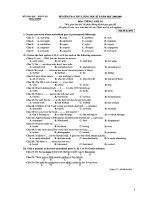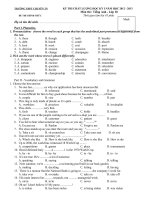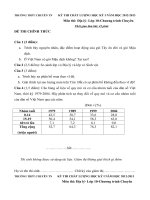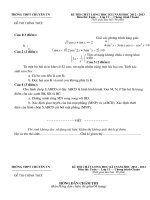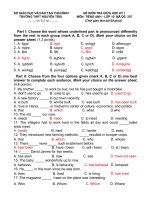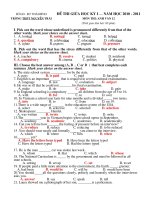DA va De Thi Anh 10 het ky I 20102011
Bạn đang xem bản rút gọn của tài liệu. Xem và tải ngay bản đầy đủ của tài liệu tại đây (80.99 KB, 2 trang )
Part I: Choose the word whose underlined part is pronounced differently from the rest in each group (mark A, B, C or
D). Mark your choice on the answer sheet. (1.2 points).
1. A. blood B. cook C. wood D. book
2. A. brown B. cow C. town D. snow
3. A. ride B. wildlife C. fill D. time
4. A. send B. return C. let D. bed
5. A. lovely B. complain C. wonderful D. month
6. A. says B. stays C. plays D. sprays
Part II: Choose from the four options given (mark A, B, C or D) one best answer to complete each sentence. Mark
your choice on the answer sheet. (3.8 points).
7. The ………… were taken to the nearest hospital by ambulance.
A. injures B. injured C. injury D. injuring
8. ………. car are you driving? – “ My father’s”
A. Who B. Whose C. Which D. How many
9. My parents prefer tea ……… coffee.
A. than B. more C. to D. rather
10. This program must be new. I have ……… seen it before.
A. ever B. never C. since D. yet
11. I ………… television a lot but I don’t any more.
A. was watching B. are used to watch
C. used to watch D. am watching
12. ………… does it take you to go to school? – “About half an hour”.
A. How many B. How far C. How much D. How long
13. I’m interested ………… chess but I’m not very good ……… it.
A. in - in B. in - for C. about - for D. in - at
14. John is ……… on climbing mountains.
A. fond B. interested C. keen D. pleased
15. Everyone likes him, ………… ?
A. doesn’t he B. doesn’t she C. don’t they D. don’t you
16. Christmas, the weather has been quite good.
A. From B. Since C. On D. For
17. Nam is interested in English.
A. learning B. to learn C. learn D. learned
18. If you …………… answer the questions correctly, you won’t pass the exam.
A. won’t B. shouldn’t C. don’t D. aren’t
19. “ a cup of coffee?” – “Oh, that is very kind of you.”
A. Do you feel like B. Why don’t you C. Would you like D. Can you
20. Most people enjoy …………… to different parts of the world.
A. travelling B. to travel C. travelled D. travel
21. Look! The sun again.
A. is shining B. shining C. shines D. shine
22. By the time he , he had driven six hundreds miles.
A. stops B. had stopped C. stopped D. has stopped
23. When she was young, she ………………. her mother to the market.
A. used to follow B. is used to following
C. is used to follow D. used to following
24. It is too hot, makes me tired.
A. which B. who C. what D. that
25. Marie Curie was born in Warsaw _________November 7
th
, 1867.
A. on B. in C. at D. by
26. Tell me your plan, Lan. What will you do this Saturday evening?
A B C D
27. I’d rather to stay at home than go out tonight?
A B C D
28. I’m glad hearing that you are going to have your first picnic with your classmates.
A B c D
29. This is the boy who sister studied with me in high school.
A B C D
30. I like to learn English the best because it is an international language.
A B C D
Part IV: Complete the passage by marking the corresponding letter A, B, C, or D. Mark your choice on the answer
sheet. (2 points).
People are fascinated (31)……… robots. Science fiction books and movies feed people’s imagination, making them wonder
about the possibilities of robots living and (32)……… with them. Is it possible for robots to look like people, work like people,
and (33)………. like people? In the future, anything is possible. Already today, there are tens of thousunds of robots doing work
all (34)……… the world.
Robot is the name (35)…………. to any machine that can do a certain job automatically. These machines come in any shapes
and (36)………… It is possible to build a robot in the shape of a person, but most look like machines built for specific purposes.
They can controlled by (37)………… The computers tell the robot what to do and how to do it. People write the (38)
…………… for computers that control the robots. Robots can sense the environment around them and respond (39) ………….
it. They can complete several steps in a process and can try other methods if one does not work. Ordinary machines (40)
……… do these things.
31. A. at B. on C. for D. by
32. A. work B. worked C. works D. working
33. A. thinking B. thought C. think D. thinks
34. A. at B. on C. of D. over
35. A. given B. gives C. gave D. give
36. A. places B. sizes C. place D. size
37. A. computer B. program C. programs D. computers
38. A. computer B. program C. programs D. computers
39. A. at B. to C. on D. for
40. A. haven’t B. should C. will D. cannot
Part V: Read the passage and choose the best answer A, B, C, or D to complete the following sentences. Mark your
choice on the answer sheet. (1. point).
My village was never a big village, nor was it particularly successful or well-known. It was a place where simple people
worked on their land, tending citrus groves and running poultry farms. The most exotic plantation grew avocados, and a palm
tree nursery was something of an attraction.
The village was established by a group of Greek immigrants in 1937 in what was then known as British-controlled Palestine.
When we first moved here, one could still hear some Greek in the street, the local store sold oringinal Greek delicacies and
from time to time we were invited to sit on a neighbor’s porch and share some ouzo at the end of a working day.
In the last few years, my village has changed dramatically. Very few people work in agriculture now; they can no longer
support their families growing oranges and chickens. As a result, they must find their income outside the village and rent out
their land or sell their little family farms altogether. Some of the land is still used for agriculture, but no longer for the family
farms. Now it is the agriculture of luxuries.
41. What was true about the writer’s village?
42. According to the passage, what did the people in the village NOT do?
43. The founders of the village were immigrants from ……………
44. What can best describe the change of the village recently?
45. How do the villagers earn their living now?
46. After John had washed his clothes, he began to study.
47. It is ages since he last came here.
48. We will miss the train if we don’t hurry up.
49. Bill didn’t go to school because of his illness.
50. There will be a shortage of water unless it rains.
The end
D. It was established by the Greek.
C. Raised animals on the farms. .
B. Greece
A. The change is very fast.
D. They hire out their land and sell their farms.
D. John began to study after he had washed his clothes.
B. He hasn’t come here for ages.
A. We will miss the train unless we hurry up.
A. Because Bill was ill, he didn’t go to school.
A. If it doesn’t rain, there will be a shortage of water.



